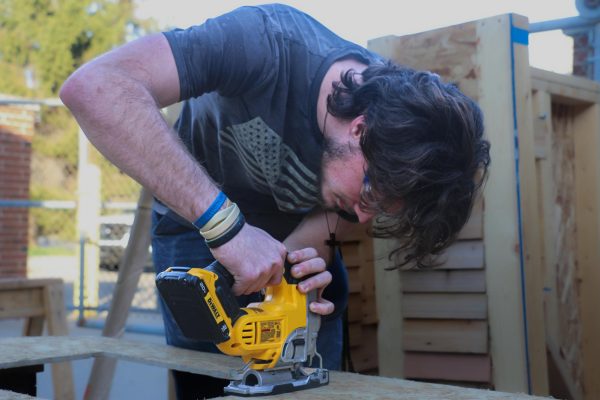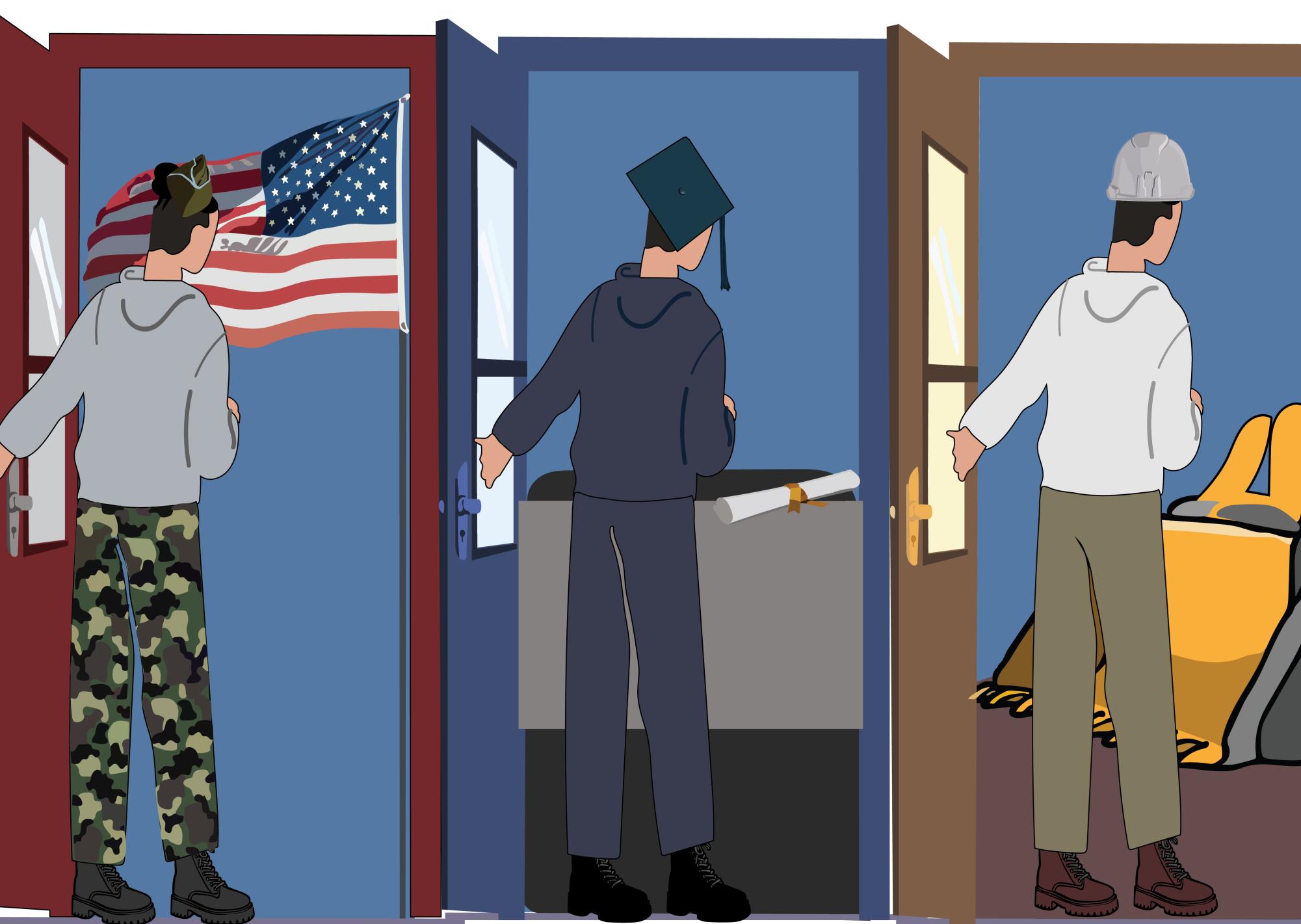Meetings with counselors for class registration started this month for students to figure out what classes they want to take in the next school year. In the online worksheet, there is also a slot for students to mark what their post-high school plans are. For most students, the choice seems pretty obvious—they will click “Attend four-year college” and move on. However, sophomore Mikko Lehikoinen’s mouse cursor has always moved past this button; instead, he clicks “Earn a career certificate or complete specialized career training,” a move he said was inspired by his grandfather.
“My grandpa’s a mason,” Lehikoinen said. “Over the summer, I went to go work with him and I really liked it.”

Lehikoinen said his grandfather had originally taken the typical route of college like his peers before deciding it wasn’t a good fit for him.
“My grandpa went to a two-year college but didn’t see any jobs he liked, so he thought it would be a good idea to go to trade school for a little bit,” Lehikoinen said. “So he became a mason. He really liked the masonry because it made him really buff and he liked that.”

Lehikoinen is one of a growing number of students who choose to pursue a different route than college. According to a 2021-2022 study conducted by the National Student Clearinghouse, a nonprofit researching education, enrollment in trade schools has gone up 19.3%, whereas typical four-year college enrollment has declined by 3.4%.
For senior Traiden Bacon-Wruble, trade schools offer him the opportunity to explore his ideal career better than college would.
“Trade school is not like normal college; it’s more like you go there to learn hands-on skills that you can apply at a career or job you want to pursue,” Bacon-Wruble said. “When you go to trade school they can actually make you an apprentice at a job site so you get hands-on experience.”
Lehikoinen said he agreed with this statement and said going to trade school can enable students to pursue many careers during school, which college doesn’t really allow for.
“Trade school is like college but not a college. (It’s) where you learn how to be an electrician (for example). It’s not pure academics; you learn how to do something,” Lehikoinen said. “You can become an electrician, a mason or a construction worker. You can do car stuff, hands-on stuff.”
Richard “Chard” Reid, CHS work-based learning coordinator, said students should consider trade school if they know the exact career they want to pursue.
“In my mind, trade schools provide training that is only specific to what (career) you’ll be doing,” Reid said. “When I went to school, it was a liberal arts school and so you’re taking a lot of schooling (like) philosophy and language, but they might not be directly applicable to your career. So I think trade schools really prepare you for what you’ll be doing next.”
Lehikoinen said he agreed with Reid and said the specific training and education that trade schools specialized in was exactly what he had been looking for.

“Trade school will give me skills that I’ll actually use in life and not like boring math stuff,” Lehikoinen said.”I feel like trade school will give me skills that college just won’t be able to.”
Reid also said a major reason more kids are going to trade school is because it costs less than college and students can get a high-paying job in two years rather than four.
“Four-year degrees don’t make sense for every student, especially with the increasing cost of tuition. The cost of (college) tuition for universities has been rising at a much faster rate than inflation since the 2000s,” Reid said. “You’re seeing this trend of students realizing they could forgo the expense and debt that comes from regular university, pay a fraction of the cost and start working sooner and making money quicker. For some of them, they’re making $80,000 to $90,000 a year right out of the gate.”
Bacon-Wruble said the cost difference between attending a four-year college and going to trade school has
significantly impacted his decision to attend trade school.
“Regular college can be a lot more expensive than trade school,” Bacon-Wruble said. “I looked at the price difference at the college I wanted to go to, it was $79,000 just to get your bachelor’s degree, but going to trade school is only $38,000.”
Despite these benefits, data shows students are underexposed to a curriculum that could lead to career paths that align with trade schools more than standard colleges and universities. In a survey commissioned by Metal Supermarkets®, a national poll found that 62% of men and women surveyed said they didn’t learn about trade school options in high school, and 58% said they didn’t know about trade schools in their community.
This school has made an effort to expose more students to this type of curriculum with the development of a new Polytechnic Department. Principal Tim Phares said the new Polytechnic Department here was designed to give students access to courses related to future careers they might want to pursue.
“We created some pathways for students to have a real (job) experience over a couple of years,” Phares said. “We’re continuing to look at those pathways and look at different areas of professions, potential jobs students might want to go into and try to give them some experience in those (careers).”
Bacon-Wruble said this new department could help students start to cater their education to their dream career earlier in their educational paths.

“The Polytechnic Department will have more options for classes. Let’s say you’re not a logical learner, you’re more of a hands-on learner, that would be beneficial,” Bacon-Wruble said. “Let’s say they have an electrical class, which would be nice, you could just learn how to do that instead of learning earth and space or astronomy.”
Despite trade schools rising in popularity, prospective trade school students said they still face the stigma around their choice involving “unconventional education”.
Lehikoinen said the stigma surrounding trade schools is still very pronounced. Even though the majority of his family and peers have been supportive of his decision to attend trade school, Lehikoinen said he still faces some of that stigma.
“I was talking to one of my friends one time and she said that her parents would disown her if she went to trade school,” Lehikoinen said. “Some people have told me that trade school is stupid but I’m like, ‘Nah, not for me.’ Trade school is a better fit for me as I’m not that good in academics.”
Bacon-Wruble said he agreed with Lehikoinen that there is still a lot of stigma surrounding trade schools.
“There is definitely a stigma surrounding trade school,” Bacon-Wruble said. “Many people think trade school is for people who failed high school or didn’t get good enough grades to get into a good college.”
Reid said community expectations can also create stigma, and he said he encourages students to pursue whatever option is best for them without regard to societal standards.
“I think in a community like ours, there seems to be a certain expectation, whether it be family expectations, peer-pressure or just community values. Most adults in this community probably did go to a traditional four-year university, most of them probably have advanced degrees, that creates this pressure stemming from the norms of the community,” Reid said. “I think one of the most important things is you have to do something you love; if you love working with your hands, or you love the idea of being a plumber/electrician, you should 100% do that. You shouldn’t let other people’s expectations determine what you’re going to do with your life because you’ll be miserable.”
Bacon-Wruble said he agreed with this sentiment and encourage people to pursue whatever makes them happy.
Bacon-Wruble said, “Build your own path. Don’t listen to what other people have to say.”





